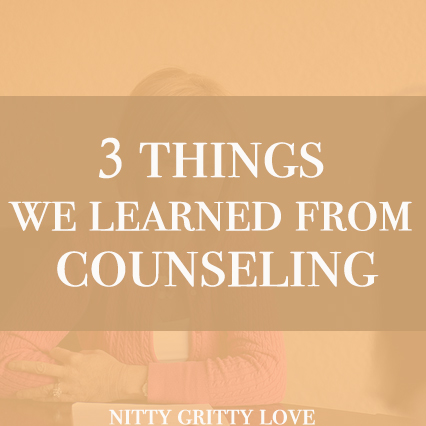3 Things We Learned from Marriage Counseling
 If you find yourself stuck in a vicious cycle in your marriage, getting an outside perspective can help. Problems don’t usually arise suddenly. It’s more likely that things have slowly and subtly become bad. We tend to ignore issues until we find ourselves in a miserable situation. Marriage is difficult at times, but brushing things under the rug just prolongs and even intensifies things at times.
If you find yourself stuck in a vicious cycle in your marriage, getting an outside perspective can help. Problems don’t usually arise suddenly. It’s more likely that things have slowly and subtly become bad. We tend to ignore issues until we find ourselves in a miserable situation. Marriage is difficult at times, but brushing things under the rug just prolongs and even intensifies things at times.
A good counselor can be so helpful to your marriage when you find yourself frustrated. If your spouse refuses to go, then take the time to go yourself. You might find that talking things out and getting a new perspective can help your relationship.
We spent a good year in counseling. There were valuable lessons we gained from this time. Our counselor was a wise man who understood grace and the gospel. This helped tremendously as we walked through the process of healing and protecting our marriage. Here are a few things I learned:
1. Practice good communication
We learned how to communicate in a way that wasn’t toxic and selfish. Our counselor said when we started going to counseling, he was amazed at how we spoke to each other. It was as if we backed up a dump truck and just unloaded all the junk on top of each other. No wonder we ended up fighting. We learned that listening was more important that talking. We practiced being patient and learned that having empathy for each other went a long way when it came to making progress while discussing difficult topics.
2. Protect the marriage
Our marriage needs to be protected from all sorts of outside influences. There are countless things that try to infiltrate our relationship. Our counselor drew a picture of a house on his dry erase board. He demonstrated the importance of boarding up the windows and doors to anything that might try to enter our marriage and damage it. This included things like work demands, other people, pornography, extended family, and social media.
It’s important to protect your marriage because it’s sacred and vital to you, and to your children. If the marriage is falling apart, chances are your children are feeling the pain of it as well. Be intentional about guarding your relationship. Don’t feel bad about setting boundaries in order to keep out unwanted influences.
3. Promote intimacy
It’s easy to get so busy that we stop connecting physically with each other. The bonding process is directly related to touch, eye contact, and time alone with one another. This might be more challenging for some people than it is for others. Some people are downright terrified of intimacy. If so, it’s good to start with baby steps. One small practice we did was called “pillow time.” While in bed we faced each other and talked while looking directly into each other’s eyes. This was shockingly uncomfortable at first, but it really did help in connecting us and forcing better listening.
These days couples spend more time staring at computer screens than each other. Media and entertainment demand our attention and pull us away from each other. We have lost a valuable connection because of it. Strive to have time alone together. Hold hands, go for a drive, cuddle on the couch, and keep sexual intimacy a priority in your lives. All of this will bond you to each other and keep you from slowly drifting apart.
Counseling is a helpful tool that can bring you and your spouse together. It can put you on the same page again and help make your marriage a priority. If your relationship has fallen off the radar, then consider taking time to go work on things, knowing that God is faithful and is with you as you walk through each step.
